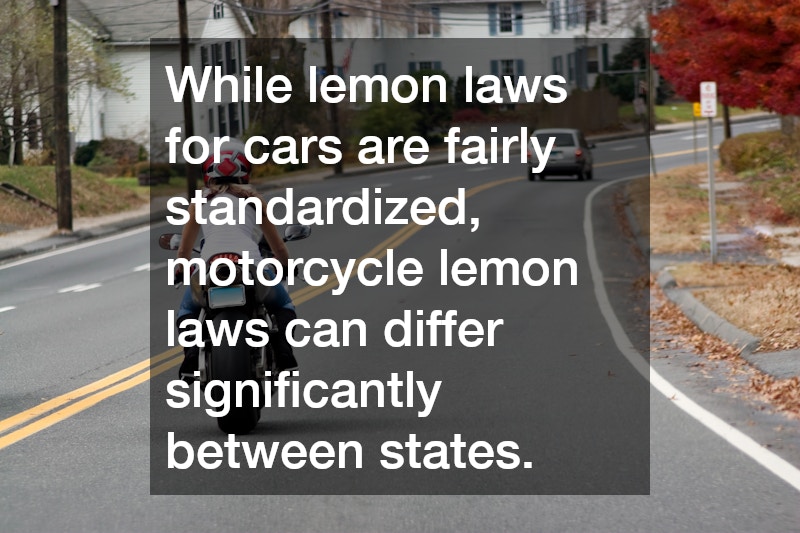When you purchase a new car or motorcycle, you expect it to perform as promised — safe, reliable, and free of persistent defects. Unfortunately, not every vehicle meets these expectations. Some cars and motorcycles develop chronic mechanical issues that repeated repairs cannot fix. This is where lemon laws come into play. Lemon laws are designed to protect consumers who have inadvertently purchased defective vehicles, and understanding these rights can make all the difference when seeking justice and compensation.
To fully understand this area of consumer protection, auto and motorcycle lemon law attorneys often emphasize the importance of knowing how these laws operate, who they protect, and what steps to take if you find yourself with a “lemon.”
What Are Lemon Laws?
Lemon laws are state-level statutes that offer remedies to consumers who have purchased or leased new vehicles that fail to meet quality and performance standards. These laws typically require manufacturers to repair, replace, or refund defective vehicles that cannot be fixed after a reasonable number of attempts. While each state’s law varies slightly, the core principle remains the same: protecting consumers from being stuck with vehicles that spend more time in the repair shop than on the road.
Although lemon laws originally applied primarily to cars, many states have extended these protections to motorcycles and other motor vehicles. This is a crucial development for riders, as defective motorcycles can pose even greater safety risks than defective cars due to their lack of enclosure and increased exposure to road hazards.
Understanding the Legal Definition of a “Lemon”
A “lemon” is generally defined as a new vehicle that has a substantial defect covered by warranty and that cannot be repaired within a reasonable number of attempts. What constitutes a “reasonable number” depends on state law. In some states, it may be three or four repair attempts for the same issue; in others, it could be defined by how long the vehicle is out of service — often 30 days or more during the first year or warranty period.
For example, if a new motorcycle repeatedly experiences engine stalling, brake failures, or electrical malfunctions that remain unresolved after multiple repair attempts, it might qualify as a lemon. Motorcycle lemon law attorneys often stress the importance of documenting every visit to the repair shop, keeping copies of all work orders, and recording how long the motorcycle is unavailable. This documentation forms the backbone of any successful lemon law claim.
How Lemon Laws Apply to Motorcycles
While lemon laws for cars are fairly standardized, motorcycle lemon laws can differ significantly between states. Some states include motorcycles under their automobile lemon laws, while others have separate provisions or may not explicitly include motorcycles at all. This is why consulting experienced motorcycle lemon law attorneys is essential. They can determine whether your motorcycle qualifies under state statutes and help navigate the unique nuances of each jurisdiction.
For instance, in California, motorcycles are explicitly covered under the state’s lemon law, the Song-Beverly Consumer Warranty Act. However, in states like Michigan, coverage for motorcycles is more limited, and consumers may have to rely on other legal theories, such as breach of warranty or consumer protection statutes.
The Role of Auto and Motorcycle Lemon Law Attorneys
Lemon law claims can be complex. Manufacturers and dealerships often have legal teams and technical experts working to deny or minimize claims. This is where specialized attorneys step in. Auto and motorcycle lemon law attorneys are experienced in consumer protection and warranty litigation, ensuring that vehicle owners are not taken advantage of by powerful corporations.
These attorneys assist clients by:
-
Reviewing all repair and purchase documentation
-
Communicating directly with manufacturers
-
Determining whether the defect qualifies under state lemon law criteria
-
Negotiating settlements or pursuing arbitration
-
Filing lawsuits when necessary
In many states, lemon laws also include a “fee-shifting” provision, meaning that if the consumer wins, the manufacturer must pay the attorney’s fees. This ensures that consumers can access skilled legal representation without worrying about out-of-pocket costs.
What to Expect When Filing a Lemon Law Claim
When you contact a lemon law attorney, the process typically begins with an initial consultation. You’ll be asked to provide your purchase contract, warranty information, and repair records. The attorney will then assess whether your vehicle meets the requirements of the state’s lemon law.
If the case qualifies, the attorney will file a claim or begin negotiations with the manufacturer. Many cases are resolved through settlement — either by replacement of the defective vehicle, repurchase, or cash compensation. If the manufacturer refuses to cooperate, your attorney can escalate the case to arbitration or court.




